Abstract
OBJECTIVES: The purpose of this study was to estimate, for the period 1971 through 1989, occupation-specific risks of breast cancer among Swedish women employed in 1970. METHODS: Age-period standardized incidence ratios were computed. Log-linear Poisson models were fitted, with geographical area and town size taken into account. Risks were further adjusted for major occupational group, used as a proxy for socioeconomic status. Risk estimators were also calculated for women reporting the same occupation in 1960 and 1970. RESULTS: Most elevated risks among professionals, managers, and clerks were reduced when intragroup comparisons were carried out, indicating the confounding effect of socioeconomic status. Excess risks were found for pharmacists, teachers of theoretical subjects, schoolmasters, systems analysts and programmers, telephone operators, telegraph and radio operators, metal platers and coaters, and hairdressers and beauticians, as well as for women working in 1960 and 1970 as physicians, religious workers, social workers, bank tellers, cost accountants, and telephonists. CONCLUSIONS: While the high risks observed among professional, administrative, and clerical workers might be related to lower birth rates and increased case detection, excess risks found for telephone workers and for hairdressers and beauticians deserve further attention.
Full text
PDF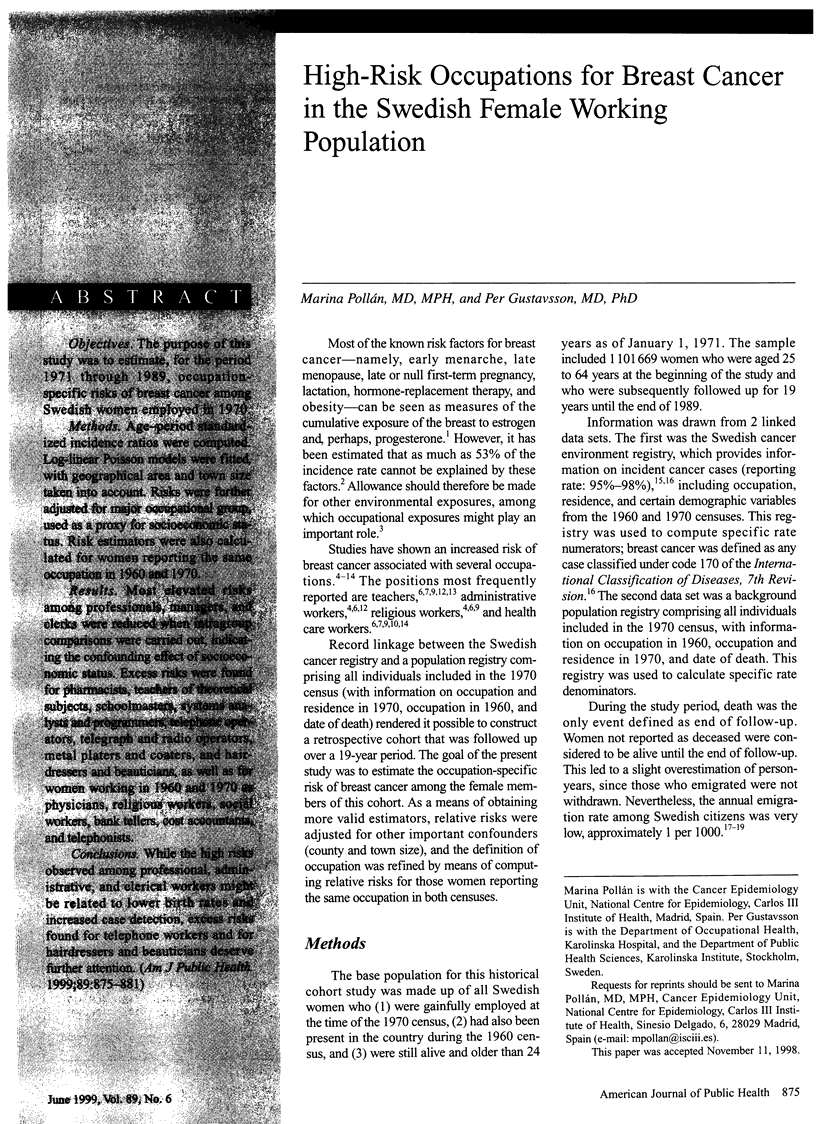

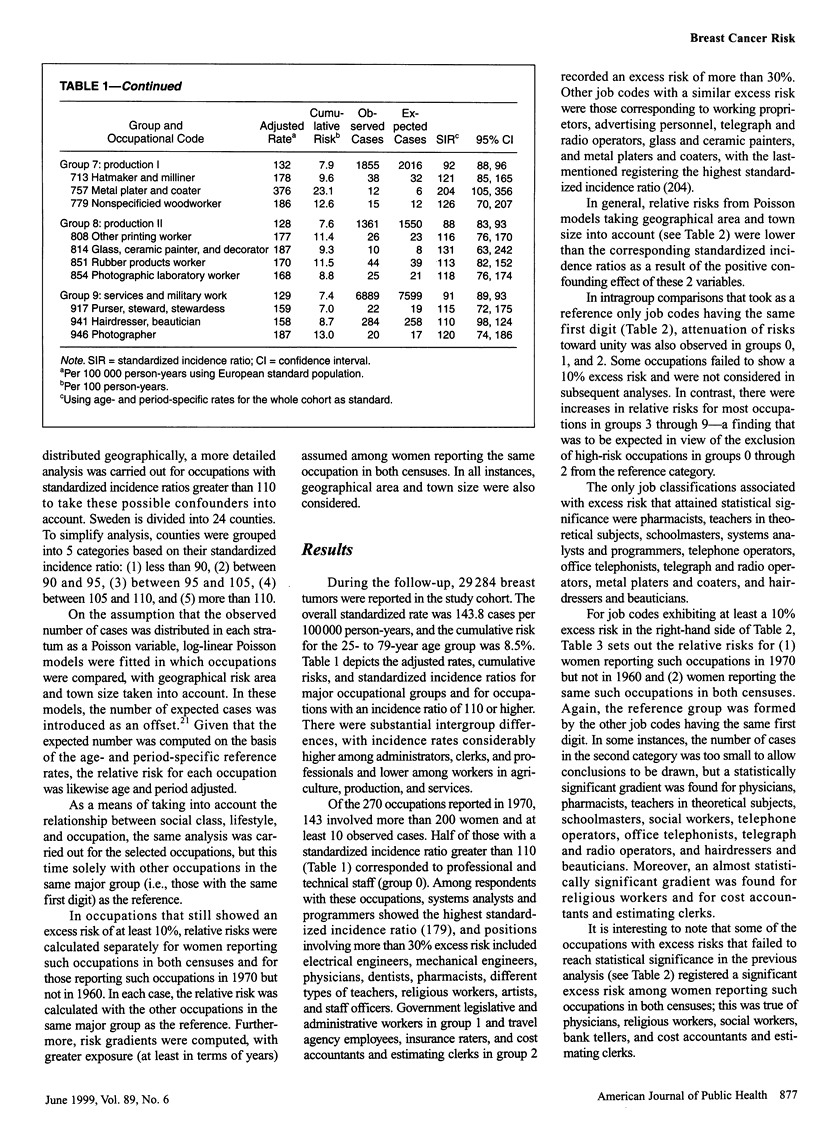
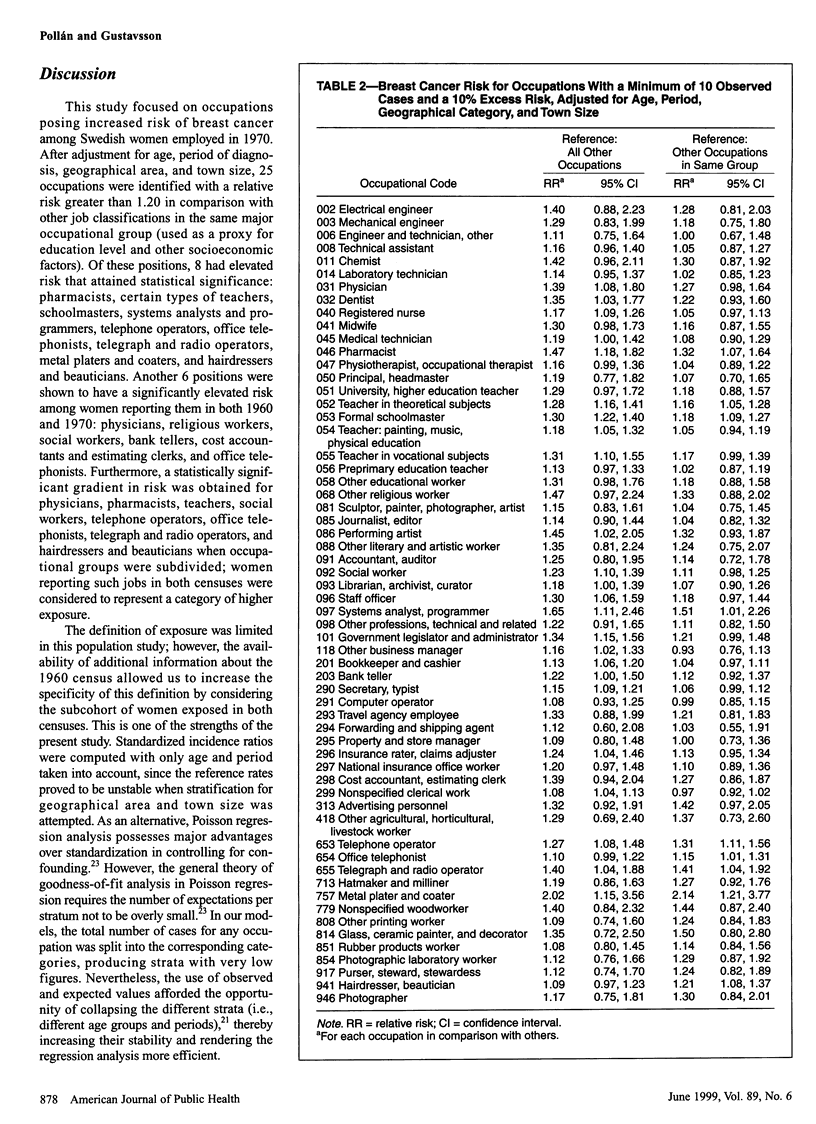
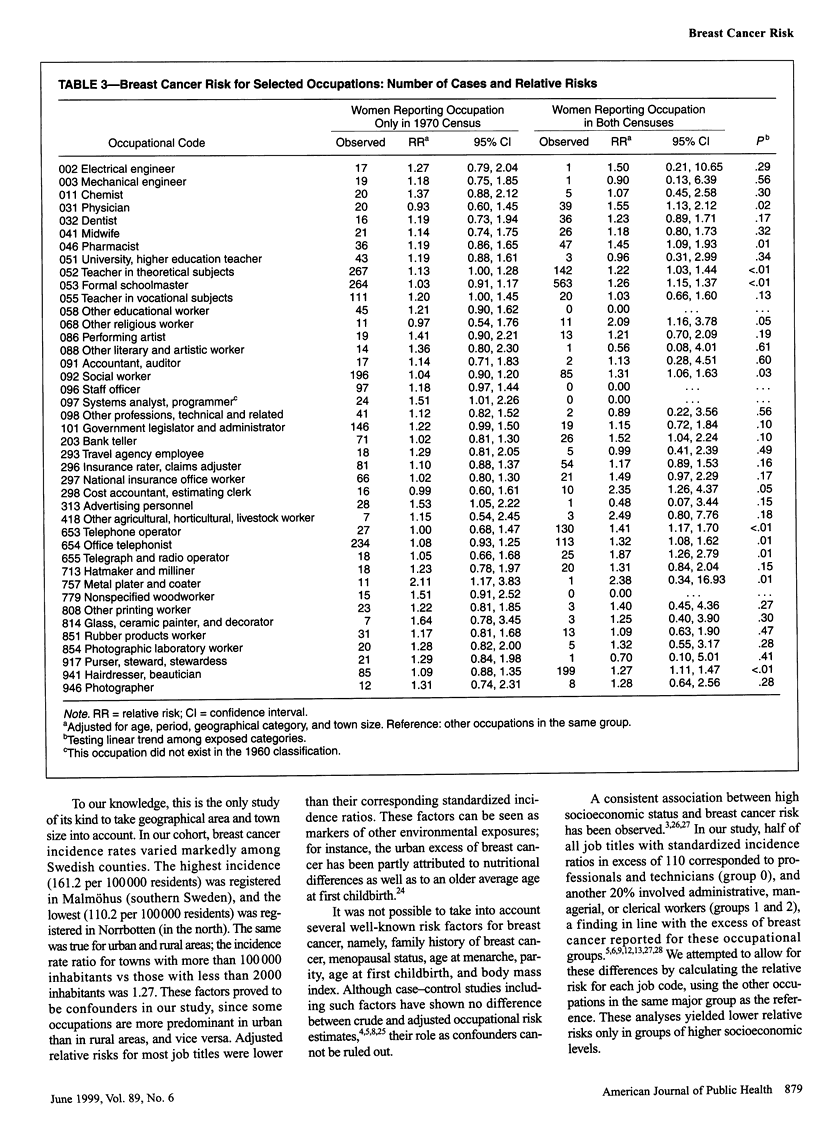
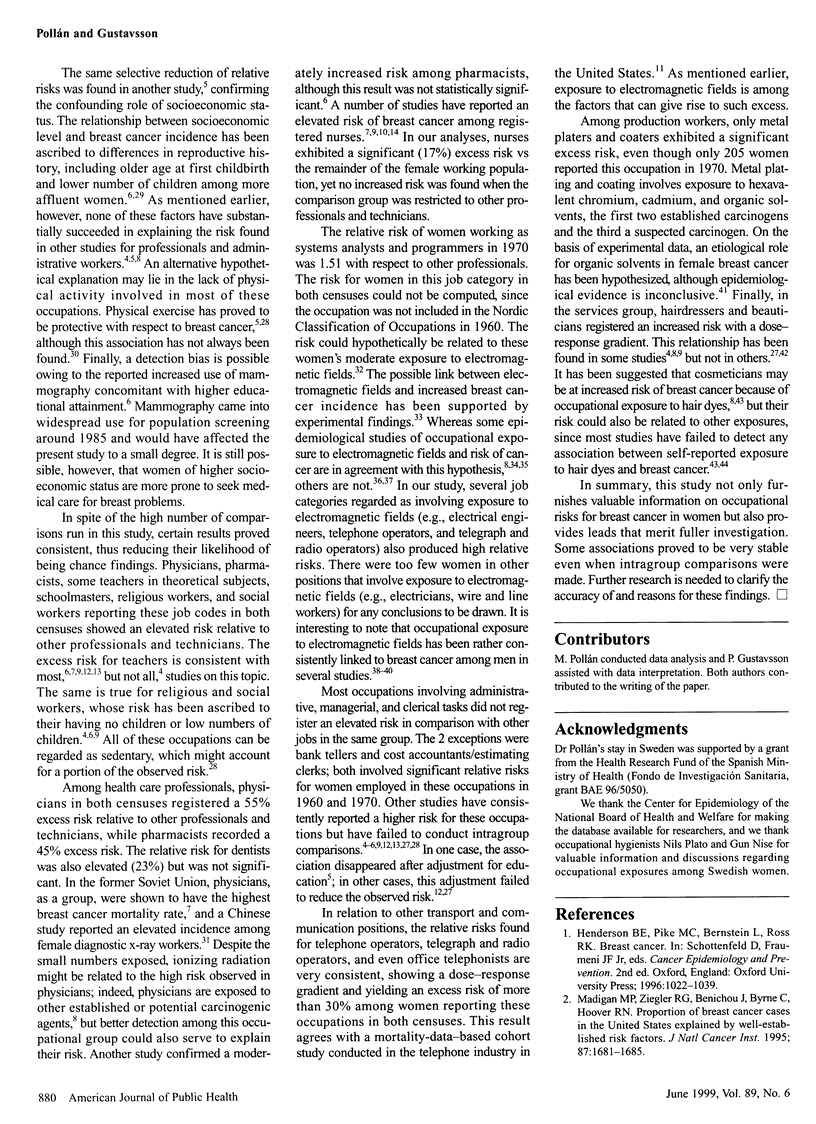
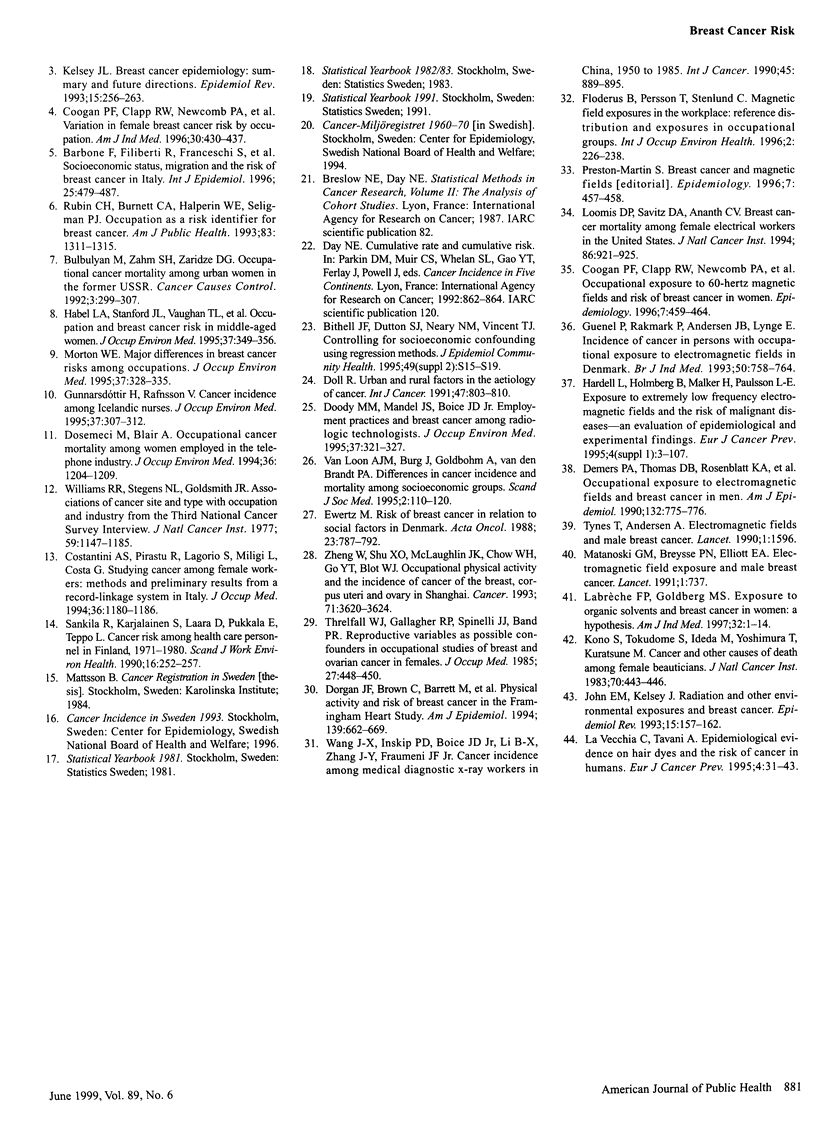
Selected References
These references are in PubMed. This may not be the complete list of references from this article.
- Barbone F., Filiberti R., Franceschi S., Talamini R., Conti E., Montella M., La Vecchia C. Socioeconomic status, migration and the risk of breast cancer in Italy. Int J Epidemiol. 1996 Jun;25(3):479–487. doi: 10.1093/ije/25.3.479. [DOI] [PubMed] [Google Scholar]
- Bithell J. F., Dutton S. J., Neary N. M., Vincent T. J. Controlling for socioeconomic confounding using regression methods. J Epidemiol Community Health. 1995 Dec;49 (Suppl 2):S15–S19. doi: 10.1136/jech.49.suppl_2.s15. [DOI] [PMC free article] [PubMed] [Google Scholar]
- Bulbulyan M., Zahm S. H., Zaridze D. G. Occupational cancer mortality among urban women in the former USSR. Cancer Causes Control. 1992 Jul;3(4):299–307. doi: 10.1007/BF00146882. [DOI] [PubMed] [Google Scholar]
- Coogan P. F., Clapp R. W., Newcomb P. A., Mittendorf R., Bogdan G., Baron J. A., Longnecker M. P. Variation in female breast cancer risk by occupation. Am J Ind Med. 1996 Oct;30(4):430–437. doi: 10.1002/(SICI)1097-0274(199610)30:4<430::AID-AJIM8>3.0.CO;2-Z. [DOI] [PubMed] [Google Scholar]
- Coogan P. F., Clapp R. W., Newcomb P. A., Wenzl T. B., Bogdan G., Mittendorf R., Baron J. A., Longnecker M. P. Occupational exposure to 60-hertz magnetic fields and risk of breast cancer in women. Epidemiology. 1996 Sep;7(5):459–464. [PubMed] [Google Scholar]
- Costantini A. S., Pirastu R., Lagorio S., Miligi L., Costa G. Studying cancer among female workers: methods and preliminary results from a record-linkage system in Italy. J Occup Med. 1994 Nov;36(11):1180–1186. doi: 10.1097/00043764-199411000-00003. [DOI] [PubMed] [Google Scholar]
- Doll R. Urban and rural factors in the aetiology of cancer. Int J Cancer. 1991 Apr 1;47(6):803–810. doi: 10.1002/ijc.2910470602. [DOI] [PubMed] [Google Scholar]
- Doody M. M., Mandel J. S., Boice J. D., Jr Employment practices and breast cancer among radiologic technologists. J Occup Environ Med. 1995 Mar;37(3):321–327. doi: 10.1097/00043764-199503000-00009. [DOI] [PubMed] [Google Scholar]
- Dorgan J. F., Brown C., Barrett M., Splansky G. L., Kreger B. E., D'Agostino R. B., Albanes D., Schatzkin A. Physical activity and risk of breast cancer in the Framingham Heart Study. Am J Epidemiol. 1994 Apr 1;139(7):662–669. doi: 10.1093/oxfordjournals.aje.a117056. [DOI] [PubMed] [Google Scholar]
- Dosemeci M., Blair A. Occupational cancer mortality among women employed in the telephone industry. J Occup Med. 1994 Nov;36(11):1204–1209. doi: 10.1097/00043764-199411000-00006. [DOI] [PubMed] [Google Scholar]
- Ewertz M. Risk of breast cancer in relation to social factors in Denmark. Acta Oncol. 1988;27(6B):787–792. doi: 10.3109/02841868809094358. [DOI] [PubMed] [Google Scholar]
- Floderus B, Persson T, Stenlund C. Magnetic-field Exposures in the Workplace: Reference Distribution and Exposures in Occupational Groups. Int J Occup Environ Health. 1996 Jul;2(3):226–238. doi: 10.1179/oeh.1996.2.3.226. [DOI] [PubMed] [Google Scholar]
- Gunnarsdóttir H., Rafnsson V. Cancer incidence among Icelandic nurses. J Occup Environ Med. 1995 Mar;37(3):307–312. doi: 10.1097/00043764-199503000-00007. [DOI] [PubMed] [Google Scholar]
- Guénel P., Raskmark P., Andersen J. B., Lynge E. Incidence of cancer in persons with occupational exposure to electromagnetic fields in Denmark. Br J Ind Med. 1993 Aug;50(8):758–764. doi: 10.1136/oem.50.8.758. [DOI] [PMC free article] [PubMed] [Google Scholar]
- Habel L. A., Stanford J. L., Vaughan T. L., Rossing M. A., Voigt L. F., Weiss N. S., Daling J. R. Occupation and breast cancer risk in middle-aged women. J Occup Environ Med. 1995 Mar;37(3):349–356. doi: 10.1097/00043764-199503000-00012. [DOI] [PubMed] [Google Scholar]
- Hardell L., Holmberg B., Malker H., Paulsson L. E. Exposure to extremely low frequency electromagnetic fields and the risk of malignant diseases--an evaluation of epidemiological and experimental findings. Eur J Cancer Prev. 1995 Sep;4 (Suppl 1):3–107. doi: 10.1097/00008469-199509001-00001. [DOI] [PubMed] [Google Scholar]
- John E. M., Kelsey J. L. Radiation and other environmental exposures and breast cancer. Epidemiol Rev. 1993;15(1):157–162. doi: 10.1093/oxfordjournals.epirev.a036099. [DOI] [PubMed] [Google Scholar]
- Kelsey J. L. Breast cancer epidemiology: summary and future directions. Epidemiol Rev. 1993;15(1):256–263. doi: 10.1093/oxfordjournals.epirev.a036112. [DOI] [PubMed] [Google Scholar]
- Kono S., Tokudome S., Ikeda M., Yoshimura T., Kuratsune M. Cancer and other causes of death among female beauticians. J Natl Cancer Inst. 1983 Mar;70(3):443–446. [PubMed] [Google Scholar]
- La Vecchia C., Tavani A. Epidemiological evidence on hair dyes and the risk of cancer in humans. Eur J Cancer Prev. 1995 Feb;4(1):31–43. doi: 10.1097/00008469-199502000-00003. [DOI] [PubMed] [Google Scholar]
- Labrèche F. P., Goldberg M. S. Exposure to organic solvents and breast cancer in women: a hypothesis. Am J Ind Med. 1997 Jul;32(1):1–14. doi: 10.1002/(sici)1097-0274(199707)32:1<1::aid-ajim1>3.0.co;2-3. [DOI] [PubMed] [Google Scholar]
- Loomis D. P., Savitz D. A., Ananth C. V. Breast cancer mortality among female electrical workers in the United States. J Natl Cancer Inst. 1994 Jun 15;86(12):921–925. doi: 10.1093/jnci/86.12.921. [DOI] [PubMed] [Google Scholar]
- Madigan M. P., Ziegler R. G., Benichou J., Byrne C., Hoover R. N. Proportion of breast cancer cases in the United States explained by well-established risk factors. J Natl Cancer Inst. 1995 Nov 15;87(22):1681–1685. doi: 10.1093/jnci/87.22.1681. [DOI] [PubMed] [Google Scholar]
- Matanoski G. M., Breysse P. N., Elliott E. A. Electromagnetic field exposure and male breast cancer. Lancet. 1991 Mar 23;337(8743):737–737. doi: 10.1016/0140-6736(91)90325-j. [DOI] [PubMed] [Google Scholar]
- Morton W. E. Major differences in breast cancer risks among occupations. J Occup Environ Med. 1995 Mar;37(3):328–335. doi: 10.1097/00043764-199503000-00010. [DOI] [PubMed] [Google Scholar]
- Preston-Martin S. Breast cancer and magnetic fields. Epidemiology. 1996 Sep;7(5):457–458. doi: 10.1097/00001648-199609000-00001. [DOI] [PubMed] [Google Scholar]
- Rubin C. H., Burnett C. A., Halperin W. E., Seligman P. J. Occupation as a risk identifier for breast cancer. Am J Public Health. 1993 Sep;83(9):1311–1315. doi: 10.2105/ajph.83.9.1311. [DOI] [PMC free article] [PubMed] [Google Scholar]
- Sankila R., Karjalainen S., Lärä E., Pukkala E., Teppo L. Cancer risk among health care personnel in Finland, 1971-1980. Scand J Work Environ Health. 1990 Aug;16(4):252–257. doi: 10.5271/sjweh.1787. [DOI] [PubMed] [Google Scholar]
- Threlfall W. J., Gallagher R. P., Spinelli J. J., Band P. R. Reproductive variables as possible confounders in occupational studies of breast and ovarian cancer in females. J Occup Med. 1985 Jun;27(6):448–450. [PubMed] [Google Scholar]
- Tynes T., Andersen A. Electromagnetic fields and male breast cancer. Lancet. 1990 Dec 22;336(8730):1596–1596. doi: 10.1016/0140-6736(90)93387-5. [DOI] [PubMed] [Google Scholar]
- Wang J. X., Inskip P. D., Boice J. D., Jr, Li B. X., Zhang J. Y., Fraumeni J. F., Jr Cancer incidence among medical diagnostic X-ray workers in China, 1950 to 1985. Int J Cancer. 1990 May 15;45(5):889–895. doi: 10.1002/ijc.2910450519. [DOI] [PubMed] [Google Scholar]
- Williams R. R., Stegens N. L., Goldsmith J. R. Associations of cancer site and type with occupation and industry from the Third National Cancer Survey Interview. J Natl Cancer Inst. 1977 Oct;59(4):1147–1185. doi: 10.1093/jnci/59.4.1147. [DOI] [PubMed] [Google Scholar]
- Zheng W., Shu X. O., McLaughlin J. K., Chow W. H., Gao Y. T., Blot W. J. Occupational physical activity and the incidence of cancer of the breast, corpus uteri, and ovary in Shanghai. Cancer. 1993 Jun 1;71(11):3620–3624. doi: 10.1002/1097-0142(19930601)71:11<3620::aid-cncr2820711125>3.0.co;2-s. [DOI] [PubMed] [Google Scholar]
- van Loon A. J., Brug J., Goldbohm R. A., van den Brandt P. A., Burg J [corrected to Brug J. ]. Differences in cancer incidence and mortality among socio-economic groups. Scand J Soc Med. 1995 Jun;23(2):110–120. doi: 10.1177/140349489502300206. [DOI] [PubMed] [Google Scholar]


